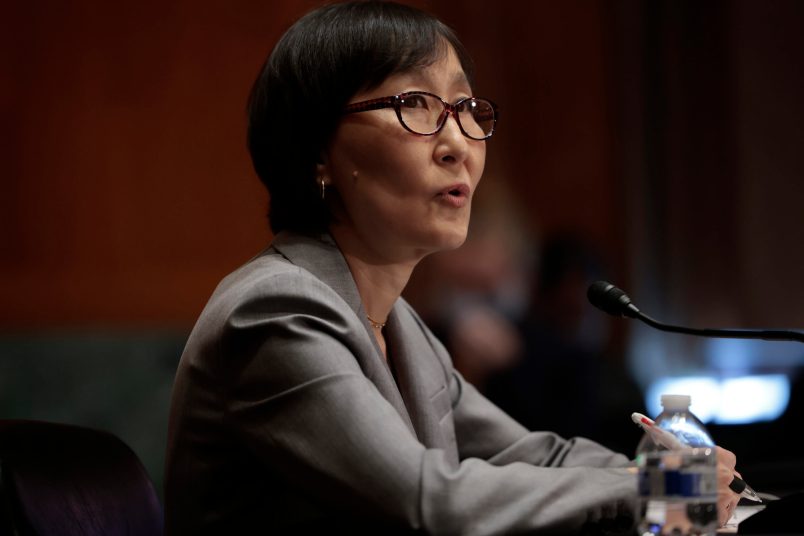Senate Republicans suggested on Thursday that a Soviet-trained communist was about to take over a key office in the country’s banking regulation infrastructure.
President Biden nominated Cornell University law professor Saule Omarova to be comptroller of the currency in September. But at her Thursday confirmation hearing, Republican senators played on Omarova’s birth in the former Soviet Union to suggest that she was a Marxist sleeper agent.
“Have you resigned from the young communists?” Sen. John Kennedy (R-LA) asked Omarova at the hearing.
Kennedy was referring to Omarova’s early years in the USSR. Born in what is now Kazakhstan, Omarova received the prestigious Lenin scholarship to study at Moscow State University. As a child, she was also a member of the komsomol, the communist youth — a common group to be involved in in the USSR.
It’s all red meat for opponents of Omarova’s candidacy on the Senate Finance Committee, which held a confirmation hearing on Thursday.
“Did you send them a letter resigning?” Kennedy asked, referring to Omarova’s komsomol membership.
Committee Chair Sen. Sherrod Brown (D-OH) interrupted him, saying that Omarova had “renounced her Soviet citizenship.”
Kennedy pressed on with Omarova: “I don’t mean any disrespect — I don’t know whether to call you professor or comrade.”
Omarova is up for an extremely important role. As comptroller of the currency, she’ll be in charge of chartering banks, and supervising them. It’s a job that holds great authority over the country’s largest financial institutions. The office can levy fines and restrict activities of banks if supervisors find particularly egregious deficiencies.
“What do the banks like? They like light regulations, and they like freedom to do what they want to do to make money,” Phillip Basil, director of banking at Better Markets, a financial regulation-focused non-profit, told TPM. “And what they don’t want as head of the comptroller of the currency is someone who is going to pursue strong supervision. That means they’re going to have to spend a lot of money on infrastructure — staff that are just pure overhead.”
“So the more assertive the supervisory program is, under the head of the OCC, the more banks are going to be concerned for a couple of reasons,” Basil added.
Before the Thursday hearing, the campaign against Omarova’s nomination was already in full gear.
The Wall Street Journal editorial board published a piece last-month decrying her positions on tougher regulation, while also including the same suggestion that her upbringing in the Soviet Union continued to hold influence over her.
“Senate Republicans have asked for a copy of her thesis ‘Karl Marx’s Economic Analysis and the Theory of Revolution in The Capital,'” the column reads. “She hasn’t complied, and neither has she repudiated her Soviet-era views.”
Sen. Pat Toomey (R-PA) took a similar line in his opening remarks, saying that “taken in their totality, her ideas amount to a socialist manifesto for American financial services.” He has also demanded that Omarova provide a copy of her undergraduate thesis.
Omarova addressed the thesis at the Thursday hearing, pointing out that she wrote it as an undergraduate while saying that, when departing Moscow 33 years ago, she would have been surprised to learn that the document would be of interest to a future congressional panel.
“It did not reflect my views then; it does not reflect them now,” Omarova replied, adding that she was living under a totalitarian regime with a state ideology at the time. “I could not choose where I was born.”
Sen. Kennedy pressed the point, telling Omarova, “you studied scientific communism, the science regarding the working class struggle and the communist agenda.”
“You called the financial services industry a ‘quintessential asshole industry,'” he added, referencing more recent remarks.
“My family suffered under the communist regime,” Omarova replied. “I grew up without knowing half of my family.”
Apart from political repression, Kazakhstan experienced a devastating famine under Soviet rule. According to some estimates, as many as 1.5 million died from starvation in the region during the collectivization campaign in the early 1930s, with more than a quarter of the Kazakh population disappearing.
“My grandmother herself escaped death twice under the Stalin regime,” Omarova added. “This is what’s seared in my mind. That’s who I am.”



